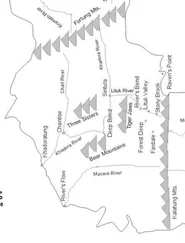You hoped to play tourist here once, long ago, in a world past reconstructing. Now you do, checking off the night-etched silhouette against the one filed away in your mental Baedecker. Six eerie Corinthian capitals, six stray verticals — all that's left of the belief they stood for. Jihad could not have built a more surreal set for your safekeeping. This glimpse of awful otherworldliness trips you up. You stumble, and someone cracks you across the crown of your skull. Then looking is over for
this lifetime.
When the blindfold comes off, your new home opens onto blackness. But in the morning, real light streams through a million louvered slats. It pins you, blinded, to the bright, clean floor. What should have been another slime-covered cave is instead the opulent country villa of some wealthy sympathizer.
The room is a bare but blazing white. The floors are a handsome hardwood, and the ceiling's scalloped medallion surrounds a hollow socket that once fed a chandelier. French shutters stand clasped together. Most glorious of all, there is no radiator. No place at all to attach a leg chain.
You rise and walk. It's like one of those avant-garde plays, where the lead goes to heaven and doesn't realize he's dead until the fourth act. You edge sideways to the shutters, shielding your eyes against the concentrated blast. When your pupils at last attenuate — peeling back a year and a half of shadow — they refuse the evidence. Outside your window is a farm.
All morning, you trace tight, excited circles. You live here. You live here. Luck beyond rolling. At the first sound at the heavy oak door, you slip on your blindfold and wipe the stray canary feathers from the corners of your grin. But your guards arrive with drills, hammers, industrial staple guns.
You huddle against a wall, weeping. It no longer matters who sees you. The room goes dark, to the sound of sheet metal riveted over the French windows. Then worse: the sound of a brace being set into the floor. When the redecorating party leaves, you lift your blindfold. Your chain is back, attached to an iron staple large enough to moor a ship. Next to it on the floor lies a thin mattress whose stains trace a map as familiar as that of Iowa.
No prior breakdown can compare. No zero degree where the dead-drop bottoms out. The trench of depression rises up around you without limit. You grab hold of anything to slow the frictionless slip — the glimpse of silhouetted temple, the daylight farm. Drafts gust in through cracks in the wall. A brush of wind, the scent of grass, the rustle of a place that predates politics. But all of memory is not enough evidence to keep you here.
Days pass when the thought of what lies behind your sheet tin — all that has been taken away from you — plunges you into a place not worth surviving. Worse, this torment pays for nothing. Your whole sacrificed life does not right a single wrong committed against your holders. Half the world, held hostage, would be too little to fix history. And that thought cuts you loose to drop still deeper.
A clicking the size of a cricket keeps you from falling forever. It plays one day for the space of a few minutes. It sounds like the metronome a rat pianist might use when struggling to tame a rodent sonata. A tentative, regular ticking in the pipes of this rural chateau. The chirping of an artificial sparrow. A doll's clock. It dies out a measure and a half after it starts.
Then, two days later, it comes back.
Three shorts, three longs, three shorts. The international distress call of all ships at sea. It forces a whoop from you, then another, softer. A laugh, wet, spastic, soft enough to evade detection. Your east wall is another man's west. Just on the far side of those six inches, someone lives. Just as suddenly, the broadcast breaks off once more. The dispatch quits, unanswered. Fifteen hours will have to pass before you're off the chain, before you can reach the wall to send back a reply. You pull on the metal staple in panic. The sender has given up on you, on your empty cell. You'll never hear from him again.
Then it occurs to you: this guy isn't going anywhere anytime soon.
The hours until your next exercise creep like a slug in a headwind. As the moment nears, thoughts vanish in an ecstatic buzz. Unleashed, you run an agonizing couple of diversionary laps until the guard disappears. Then you fall down convulsed in front of the altar wall, thrilled
into silence.
It's as if the skies have finally cracked open with a message from beings a thousand light-years away. And now, after the thousand-year passage, Earth must send its one summary greeting that will take a millennium to return. Morse is not an option. Nor is any other compressed transmission. All you have is that ancient trick, the cumbersome, cuneiform stupidity: one tap equals A; two equals B…
You cannot waste time with anything so irrelevant as "hello." Just tapping M-A-R-T-I-N at a comprehensible pace with clear pauses between letters — making the inevitable fumbles and improvising a rapid-burst signal for "start over" — burns up a terrible fraction of your allotted thirty minutes off the chain.
Every letter risks detection. You tap softly, checking as you cycle through the alphabet for any hint of movement behind your door. Detection here would mean death or worse.
You come to the final N of your name and wait for a response. But the bottle-message drifts off into resounding silence. You repeat the whole word, although the act costs you more precious minutes. A second silence, even rounder than the first. Blackness comes on you at the inexplicable failure; the signal vanishes into the void.
But maybe he, too, can get free to tap only at certain intervals. The thought saves you long enough for another attempt. You struggle over what word should follow, the second most important disclosure after that meaningless first one. And raging against the inevitable choice, at the idiocy of having to say it, you tap A-M-E-R-I–C-A-N.
You quit while still safe, a full day's work. When the guard comes to lock you back up after your run, you're more winded than usual.
Some hours later comes a reply.
Junot. French. The answer dashes your vague fantasy of free and unhindered romps through English with a native speaker. You'd dreamed of a shorthand version of those rambling letters your brother Kamran would send each month, trapped in a Peace Corps-ravaged Mali: "Yours in appropriate technology." You'd hoped for the desperate consolations of shared diction. You'll have, at best, a hurried pidgin.
The next day, you telegraph him back: bien. A lie, by implication. The bulk of your French consists of your mother's Pahlevi-corrupted pas vraiss and merzis, all the cosmopolitan affectations of the Shah's courtier class. But a harmless enough lie, to which you attach another: courage. At least any French he responds with will be slowed to a crawl. And you'll have a day to decode it.
Junot's next reply skirts the language issue altogether. Jihad, he tells you. Hezbollah.
You can think of nothing, in fifteen hours, to answer with but oui. Shorter, by a few precious clicks in your shared language, than its English foster brother. You add: I know. You look for some semaphore to compress all that you know, all that you've learned in this private school. Eighteen months. You?
You kick yourself for having said nothing. But on his next turn Junot picks up the English thread as if it signifies. Thirty-six weeks. I know, and as the words unfold in agonizing click-tedium, you wonder why he wastes such urgent time and risks such danger to say them. Then he adds your. Then he adds name.
The word splits open and heaven air-drops manna. This man, this total stranger in the next cell, whose existence you were not even aware of until a few days ago, has heard of you. He recognizes the name you've told him. He has heard it, sometime in the year between your kidnap and his. The world has not lost track. You haven't disappeared. Your mother knows your fate. Your brother. Gwen.
Читать дальше












